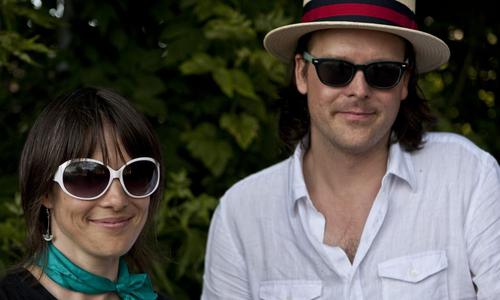Improv Notes: September 2012
 IMprov Notes: News of the Moment September 2012 2012 Guelph Jazz Festival in Photos
 The 19th annual Guelph Jazz Festival was another resounding success. This year’s festival showcased an array of innovative accomplishments in jazz and creative improvised music from around the world. The onstage interview and rare appearance by the legendary South African pianist Abdullah Ibrahim (formerly known as Dollar Brand) was one of the many highlights. Despite the challenge of sporadic rain, the Wyndham Street Jazz Tent’s relocation to Market Square in front of City Hall worked out great. Yes, it truly was another exciting festival with something for everyone, from a stimulating colloquium, which included electrifying workshops and intellectually invigorating talks, to the many musical performances around town, to what has become one of the premiere Nuit Blanche events in North America (at least in this writer's humble opinion). Here are a couple photos captured through the amateurish lens of PhD student, and Guelph Jazz Festival Board Member, Paul Watkins.
Rob Wallace and Joe Sorbara (with Alan Stanbridge) lead a John Stevens Improvisation workshop. Oral Histories Project
Oral Histories is a showcase of interviews, performances, and articles by and about improvising musicians, artists, writers and scholars. This new monthly feature will offer an intimate look inside the minds and practices of some of the many dynamic, innovative people whose energy and ideas make improvisation studies such a vibrant field of inquiry. The Oral Histories project provides a space for improvising artists to be heard in their own words, often in dialogue with other improvisers, scholars and practitioners.
SEPTEMBER 2012 FEATURE:
"Your bass sounds like a typewriter": A Reading and Interview with George Elliott Clarke. Accompanied by bassist, David Lee. George Elliott Clarke is one of Canada’s most prolific poets. He is also a renowned essayist, scholar, playwright, and, in many ways, a songwriter. This month’s Oral History—co-sponsored with the TransCanada Institute and SETS (The School of English and Theatre Studies)—proudly presents George Elliott Clarke for an interview, preceded first with Clarke reading from his latest collection of poetry, Red. On some of the poems, Clarke is accompanied by bassist and ICASP Graduate Fellow, David Lee, for an in the moment improvised performance. Following the reading is an interview with Clarke conducted by PhD student and ICASP researcher Paul Watkins and Postdoctoral Fellow Katherine McLeod of the TransCanada Institute. In the interview Clarke converses about his musical and literary influences, from the Romantics through to the Beat Movement and into African Canadian poetics. Further, Clarke discusses how he crafts his own creative poetic voice and practice in relation to a variety of artist-intellectuals across borders. Watkins and McLeod engage Clarke in critical inquiry about the nature of improvisation and music relative to his work, with a particular focus on the jazz opera, Québécité, produced and performed at the 2003 Guelph Jazz Festival. The interview is far reaching and engages in a series of cosmopolitan, multicultural, and polyphonic critical explorations that explore the role of popular song, dedication and inspiration, as well as poetic sensibility in relation to modernism and postmodernism, with a focus on the place of rhyme in poïesis. And, there is also a good measure of self-reflexive excursuses throughout the interview from the poet himself.
A full transcript of the interview is available here.
You can also find a review by Paul Watkins of Clarke’s latest book of poetry, Red, here. Quote of the Month: We have to start thinking about planetary citizenship. Not just national. -Angela Davis in Guelph, February 2nd, 2012.
|

















 Angela Davis (born January 26, 1944) is an American political activist, scholar, and author. Davis emerged as a nationally prominent activist and radical in the 1960s, as a leader of the Communist Party (USA) and Black Panther Party, and through her association with the Civil Rights Movement. Prisoner rights have been among her continuing interests; she is the founder of “Critical Resistance,” an organization working to abolish the prison-industrial complex.
Angela Davis (born January 26, 1944) is an American political activist, scholar, and author. Davis emerged as a nationally prominent activist and radical in the 1960s, as a leader of the Communist Party (USA) and Black Panther Party, and through her association with the Civil Rights Movement. Prisoner rights have been among her continuing interests; she is the founder of “Critical Resistance,” an organization working to abolish the prison-industrial complex.





